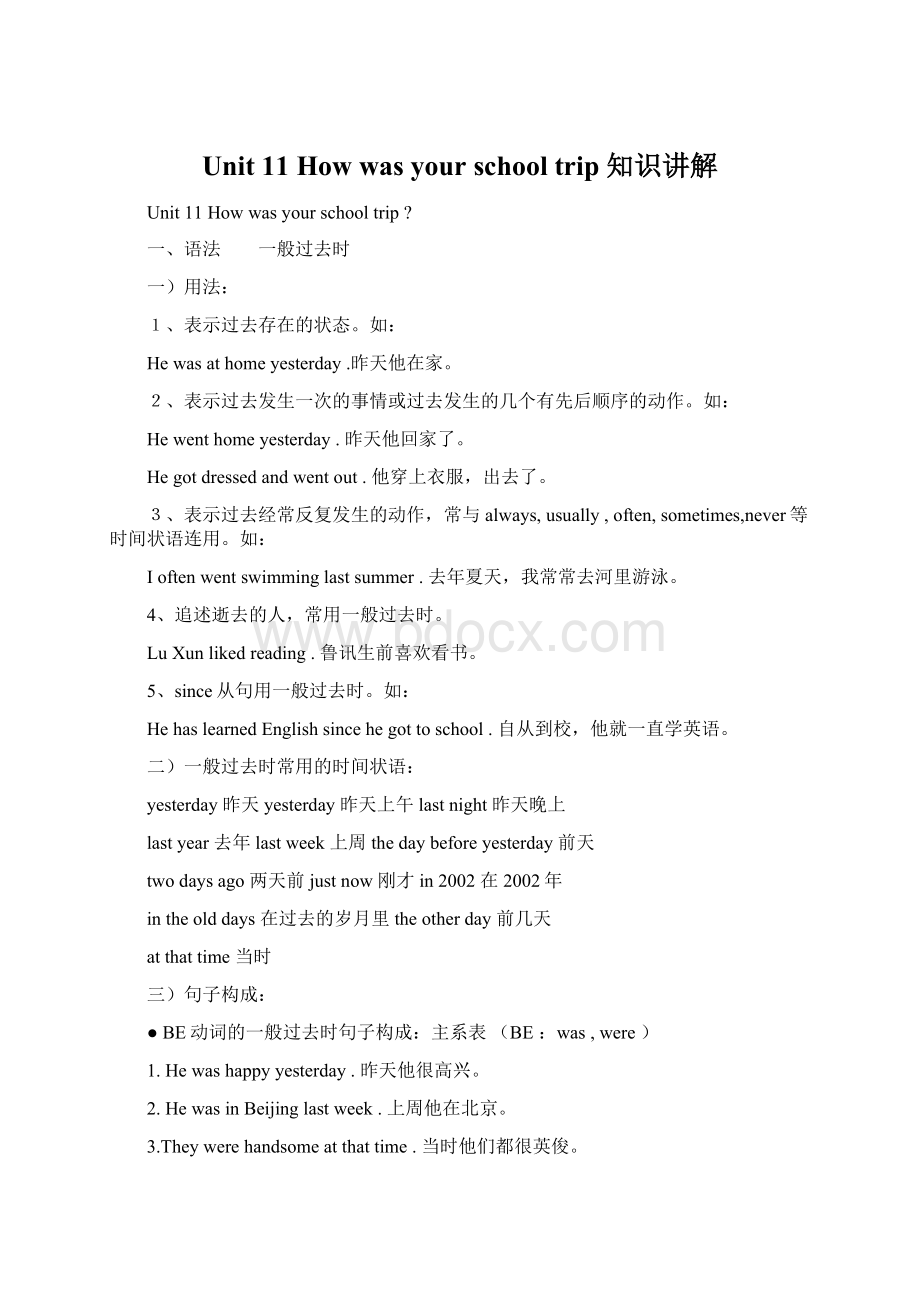Unit 11 How was your school trip 知识讲解Word文档格式.docx
《Unit 11 How was your school trip 知识讲解Word文档格式.docx》由会员分享,可在线阅读,更多相关《Unit 11 How was your school trip 知识讲解Word文档格式.docx(9页珍藏版)》请在冰豆网上搜索。

一般疑问句:
Bethere+主语+地点/时间状语?
提问可数名词的数量用:
Howmany+可数n.复数+werethere+地点/时间状语?
提问不可数名词的数量用:
Howmuch+不可数n.+wasthere+地点/时间状语?
提问主语用:
Whatwas+地点/时间状语?
1)Therewasacarandtwobusesatschoolyesterday.昨天学校里有一辆小汽车和两辆公共汽车。
2)Therewere600studentsandateacheratschoollastweek.上周学校里有600学生和一位老师。
3)Therewasabookonthesofayesterday.
Therewasn’tabookonthesofayesterday.
Wasthereabookonthesofayesterday?
提问a:
Howmanybookswerethereonthesofayesterday?
提问abook:
Whatwasonthesofayesterday?
4)Therewassomemilkinthefridgeyesterday.
Therewasn’tanymilkinthefridgeyesterday.
Wasthereanymilkinthefridgeyesterday?
提问some:
Howmuchmilkwasthereinthefridgeyesterday?
提问somemilk:
Whatwasinthefridgeyesterday?
●行为动词一般过去时的句子构成:
主语+谓语动词的过去式+…
主语+didn’t+谓语动词原形+…
Did+主语+谓语动词原形+…?
1)Hewentswimmingyesterday.昨天他去游泳了。
2)Hedidhishomeworklastnight.昨天晚上他做作业了。
3)TheywatchedTVyesterdayevening.他们昨天晚上看电视了。
4)Shedidn’treadbooksyesterday.她昨天没看书。
5)Theydidn’twashthedishesyesterdaymorning.他们昨天上午没洗衣服。
6)Didyoubuyacarlastyear?
Yes,Idid./No,Ididn’t.
你去年买汽车了?
是的,我买了。
/不,我没买。
7)Didheordermuttonnoodles?
Yes,hedid./No,hedidn’t.
他定羊肉面条了吗?
是的,他定了。
/不,他没定。
四)动词过去时形式的构成:
特殊动词的过去式:
1)am/iswas;
arewere;
dodid;
gowent;
2)getgot;
forgetforgot;
3)paypaid;
saysaid;
4)blowblew;
growgrew;
drawdrew;
flyflew;
5)beginbegan;
havehad;
comecame;
drinkdrank;
eatate;
runran;
singsang;
sitsat;
swimswam;
6)wearwore;
riderode;
drivedrove;
writewrote;
wakewoke;
speakspoke;
7)buybought;
bringbrought;
fightfought;
thinkthought;
teachtaught;
catchcaught;
8)keepkept;
sleepslept;
feelfelt;
leaveleft;
spendspent;
feedfed;
9)telltold;
sellsold;
10)readread;
cutcut;
costcost;
hithit;
hurthurt;
letlet;
putput;
11)makemade;
taketook
规则动词的过去式构成:
通过在动词词尾加ed构成,具体规则如下:
1)一般情况下直接加ed:
brushed;
cooked;
called;
climbed;
cleaned;
dreamed;
enjoyed;
finishedhelped;
joined;
jumped;
killed;
listened;
looked;
learned;
missed;
ordered;
played;
picked;
relaxed;
rained;
showed;
stayed;
shouted;
snowed;
talked;
turned;
visited;
washed;
walked;
watched;
wished;
worked;
needed;
2)以不发音的e结尾的动词,去e加ed:
arrived;
danced;
exercised;
liked;
lived;
loved;
moved;
practiced;
saved;
skated;
tasted;
used;
3)以重读闭音节结尾,结尾只有一个辅音字母时,先双写结尾的辅音字母,再加ed:
stopped;
shopped;
4)以“辅音字母+y”结尾的动词,变y为i,再加ed:
studystudied;
worryworried;
’
ed的语音规则:
清对清:
当动词以清辅音结尾时,所加的ed读清辅音[t];
浊对浊,当动词以浊辅音结尾时,所加的ed读浊辅音[d];
[t][d]后面读[id]:
当动词以[t]或[d]结尾时,所加的ed读[id];
元音后面也读[d]:
当动词以元音结尾时,所加的ed读[d];
二、教材中的词汇、短语、句子
一)动词和动词短语
1.goforawalk去散步;
2.takeawalk 散步
3.milkacow 挤牛奶;
4.rideahorse 骑马
5.feedchickens/animals喂鸡/喂养动物;
1)feedsth.tosb.给。
。
喂。
,如:
Pleasefeedsomegrasstothecow.请给牛喂些草。
Shefedmilktothebaby.她给婴儿喂了奶。
2)feedon…以…为食,如:
Sheepfeedongrass.绵羊以草为食。
6.talkwithsb. 与某人谈话 7.takephotos(of).. 给…拍照
8.growapples/vegetables/strawberries 种植苹果/蔬菜/草莓
9.showsb.aroundsp.带领某人参观某处,如:
Tomshowedmearoundhisschool.汤姆带领我参观了他的学校。
10.learnalotabout..=knowalotabout…知道/了解许多关于…
11.Pick
1)摘,采,如:
pickstrawberries/apples摘草莓/苹果
Don’tpickflowersinthepark.公园里禁止采花。
Wearepickingapplesnow.我们在摘苹果。
2)Pickup拾起,(用车)来接/捎带某人/物,如:
Hepickedupapenandputitonthedesk.他捡起一只钢笔,放在了课桌上。
I’llpickyouupatyourhometomorrow.我明天去你家接你。
12.watchthestars看星星;
13.gotothezoo去动物园
14.climbthemountains爬山
15.worrysb.使….担心,
Theboyalwaysworrieshismother.那个男孩总是让他母亲担心。
Don’tworryyourparents.不要使父母担心。
worryaboutsb.担心某人,如:
Don’tworryabouthim/her/me.不要担心他/她/我。
Tellyourparentsnottoworryaboutyou.告诉父母不要担心你。
eout
1)出来,如:
Thesuncomesout.太阳出来了。
2)(花)开放,如:
Theflowersbegintocomeoutinspring.春天花开始开放。
3)出版,发表,如:
Hisbookwillcomeoutnextweek.他的书下周出版。
17.visitamuseum/afirestation/thezoo参观博物馆/消防站/动物园
18.gofishing去钓鱼
19.gotothecountryside/themountains去乡下/大山
20.drawpictures画图画
21.goonaschooltrip参加学校郊游
22.teach
1)teachsb.sth教某人某事,如:
SheteachesusEnglish.她教我们英语。
2)teachsb.todosth.教某人做某事,如:
Sheteachesustoplaychess.她教我们下象棋。
3)teachoneself=learn…byoneself自学,
4)teachsb.howtodosth.教某人怎样做某事,如:
Shetaughtmehowtowashthedishesyesterday.昨天,她教我怎样洗餐具。
23.makeamodelrobot做机器人模型
24.gotoagiftshop去礼品店
25.buysth.forsb.=buysb.sth.给某人买某物,如:
Mymotherboughtapairofjeansformeyesterday.=Mymotherboughtmeapairofjeansyesterday.妈妈昨天给我买了一条牛仔裤。
26.haveaniceweekend周末过得愉快
27.beexcellentin….在…方面极好/非常好,如:
Heisexcellentinmath.他的数学非常好.
28.clean
1)v.打扫,清洗,
2)adj.干净的Myclassroomisveryclean.
二)其他词汇、短语
1.Didyoulearnanything?
你学到了什么?
1)anything不定代词,表示“某事/物”,主要用于否定句\疑问句中,作“任何事/物”讲时,用于肯定句中,如:
Helistened,buthedidn’thearanything.他听了听,但什么也没听到.
Isthereanythinginterestingintoday’snewspaper?
今天的报纸上有任何有趣的内容吗?
Let’sgoshopping.Andanythinginthesupermarketischeaptoday.我们购物吧,超市今天任何东西都便宜.
2)不定代词有哪些:
肯定:
某人/物
否定/疑问:
用于肯定形式中,
表否定:
无人/物
每人/物
表示人的
somebody
anybody
nobody
everybody
someone
anyone
noone
everyone
表示物的
something
anything
nothing
everything
用法一:
●somebody/something/anyone用于肯定句和表示请求建议的问句中,如:
Wouldyoulikesomethingtodrink?
来点喝的东西好吗?
●anybody/anything/anyone用于否定句和疑问句中,当表示“任何人/物”时,可以用于肯定句中,如:
Thereisn’tanybodyintheclassroom.教室里还没有人.
Ineedsomebodytohelp.AnybodyisOK.我需要人帮助.任何人都可以.
●Nothing/nobody/noone用于肯定结构中,表否定,相当,如:
●Everyone/everybody/everything一般用于肯定句中,也可以用于否定句或疑问句中,如:
Everyoneishere.人到齐了.
Iseveryonehere?
人到齐了吗?
Noteveryonelikesdumplings.并非人人都喜欢水饺.
用法二:
当不定代词作主语时,谓语用单数;
当不定代词有修饰语时,修饰语放在后面,作后置定语,如:
Thereisn’tanybodyintheclassroom.教室里还没有人
Ihavesomethingimportanttotellyou.我有一些重要的事情要告诉你.
2.luck,lucky,luckily
1)luckn.运气
Goodluck!
祝你好运.
Specialfoodscanbringgoodlucktothebirthdayperson.
2)luckyadj.幸运的,好运的Youarelucky!
/luckyyou!
你真好运!
3)luckilyadv.幸运地,通常放在句首,表示“幸运的是…”,用来修饰整个句子,如:
Luckily,wegotthereontime.幸运的是,我们准时到达了.
3.alonetheway沿路/线
Wesawsomefarmsandvillagesalongtheway.沿途我们看到了一些农场和村庄.
4.atthemuseum在博物馆
5.lovelyadj.可爱的,
Youlooklovely,Mary.你看起来很美,玛丽。
Hehadalovelyvoice.他嗓音甜美。
6.allinall,inall
1)allinall总的来说,常用于句首,如
Allinall,wehadagoodtime.总的来说,我们过得很愉快.
Allinall,itwasanexcitingday.总的来说,这是令人兴奋的一天.
2)inall总共,合计,既可放在句首,也可放在句末,如:
Thereare600studentsinourschoolinall.我校总共有600学生.
7.quite与very很,十分
1)quite与very都可以修饰形容词或副词时,very表示的程度更强一些,如:
Heisquitetall,butnotverytall.他比较高,可不是很高.
2)quite与very都可以修饰名词,但结构不同,quite+a/an+形容词+名词=a+very+形容词+名词,如:
Sheisquitealovelygirl.=Sheisaverylovelygirl.她是一个很可爱的女孩.
8.fun不可数名词,意为“乐趣,开心,有趣的人或事”,其前常用great,much,alotof等修饰,来加强语气,如:
Heisgreatfun.他是个有趣的人.
Skatingisgreatfun.滑冰是件有趣的事.
havefun玩得开心,相当于haveagoodtime/enjoyoneself,后面遇到动词时,后面的动词加ing,表示愉快地做某事,如:
Hehadmuchfuninthepark.他在公园里玩得很开心.
Heishavingfunpickingapples.他在愉快地摘苹果.
三)句子
1.Howwasyourtriplastweek?
上周你的郊游怎么样?
Howis/wassth.?
=Whatis/wassth.like?
用来询问某事情况如何的常用句型,常用答语有:
Itis/wasgreat.好极了.Itis/wasOK.还可以.Itisn’t/wasn’tgood.不好.Allright.很好.Itis/wasnotbad.还不错.等.
2.Ithinktoday’sschooltripwasterrible.我认为今天的学校效游非常糟糕.
1)本句为Ithink引导的宾语从句,主句为一般现在时,宾语从句根据具体情况选用所需时态;
如:
Ithinkitrainedyesterday.我认为昨天下雨了.
Ithinkheisstudying.我认为他在学习.
2)变否定句时,要否定主句,即否定前移,如:
Idon’tthinkhecanswim.我认为他不会游泳.
Idon’tthinkhewashedclothes.我认为他没洗衣服.
3.Theroomswerereallydarkanditwasdifficulttotakephotos.
1)darkadj.黑暗的,昏暗的,反义词为bright明亮的,如:
They'
llbebackwellbeforedark.他们会在天黑以前回来。
Whattimedoesitgetdarkinsummer?
夏天什么时候天黑?
Thenightistoodarkforustosee.夜间太暗,我们看不见.
2)Itis/looksdifficult(forsb.)todosth.对某人来说做某事怎么样,如:
It’sdifficultformetoskate.我滑冰很艰难.
Itlooksdifficultforhertoswim.看起来游泳对她很难.